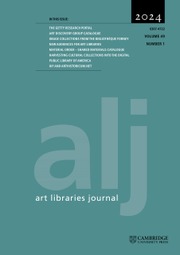No CrossRef data available.
Article contents
Justice is a process: why there is no end to the business of making our libraries more equitable
Published online by Cambridge University Press: 14 April 2025
Abstract
The work of making library collections and services more equitable is not a one-off task, but one that needs constant review and revision as perspectives and expectations change in the wider culture. Examples include three recent issues that have arisen in connection with Sotheby’s Institute of Art’s in-house book classification scheme: our use of the concepts of the Dutch Golden Age, MENA/SWANA, and the Global South/Global North. An awareness of relevant trends in contemporary thought, and a willingness to examine critically how best to respond to such trends, support librarians in offering the best service they can to their patrons.
- Type
- Research Article
- Information
- Copyright
- © The Author(s), 2025. Published by Cambridge University Press on behalf of ARLIS
References
1. Hakim Bishara, “Amsterdam Museum Will No Longer Use ‘Golden Age’ to Describe Dutch Colonial Past,” Hyperallergic, 24 September 2019, https://hyperallergic.com/519119/amsterdam-museum-will-no-longer-use-golden-age-to-describe-dutch-colonial-past/.
2. Martha Moffitt Peacock, “The Maid of Holland and Her Heroic Heiresses,” in Women and Gender in the Early Modern Low Countries, ed. Sarah Joan Moran and Amanda Pipkin (Leiden: Brill, 2019), 69n2, https://www.jstor.org/stable/10.1163/j.ctvrxk3hp.9.
3. Westermann, Mariët, A Worldly Art: The Dutch Republic 1585-1718 (Upper Saddle River: Prentice Hall, 1996).
4. Rayya El Zein, “Introduction: Cultural Constructions of Race and Racism in the Middle East and North Africa/Southwest Asia and North Africa,” Lateral: Journal of the Cultural Studies Association 10, no. 1 (spring 2021), https://csalateral.org/forum/cultural-constructions-race-racism-middle-east-north-africa-southwest-asia-mena-swana/introduction-el-zein/, n1.
5. Joud Sleilaty, “MENA vs SWANA,” Arab America, 23 August 2023, https://www.arabamerica.com/mena-vs-swana/.
6. Oxford English Dictionary, s.v. “Global South,” accessed 2 June 2024.
7. Pablo Palomino, “On the Disadvantages of ‘Global South’ for Latin American Studies,” Journal of World Philosophies 4, no. 2 (2019), https://scholarworks.iu.edu/iupjournals/index.php/jwp/article/view/3113, 31.
8. Sinah Theres Kloß, “The Global South as Subversive Practice: Challenges and Potentials of a Heuristic Concept,” The Global South 11, no. 2 (2017), 1.
9. Smith Oduro-Marfo and Marlea Clarke, “Global South: What Does It Mean and Why Use the Term?” University of Victoria, 8 August 2018, https://onlineacademiccommunity.uvic.ca/globalsouthpolitics/2018/08/08/global-south-what-does-it-mean-and-why-use-the-term/.
10. Centre for Economics and Business Research, “China,” in World Economic League Table 2024, https://cebr.com/wp-content/uploads/2023/12/WELT-2024.pdf, 66.
11. Design in Asia: The New Wave: A Design Anthology Book (London: Thames & Hudson, 2020).
12. Martin Luther King, Jr, Where Do We Go From Here: Chaos or Community? (Boston: Beacon Press, 2010), 38, Ebook Central.
13. Rhonda V. Magee, The Inner Work of Racial Justice: Healing Ourselves and Transforming Our Communities Through Mindfulness (New York: TarcherPedigree, 2019), 20.


